The Ultimate Guide to Employment Reference Checks
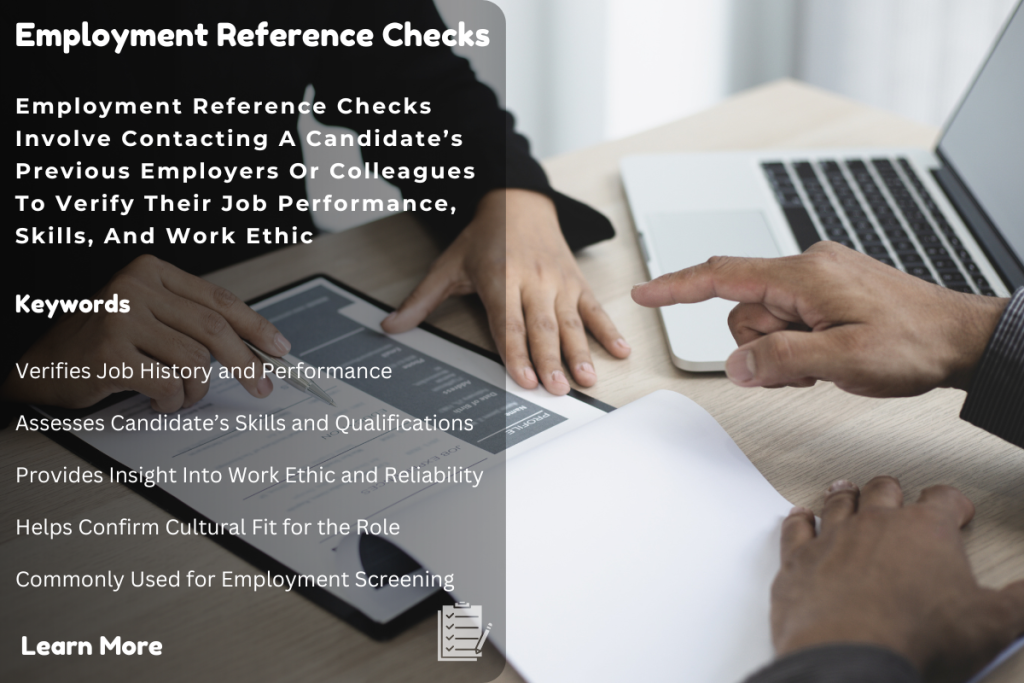
What is an Employment Reference Check and Why Is It Important?
An employment reference check is a process employers use to verify the background, qualifications, and work history of a job candidate by contacting people who have previously worked with the candidate. These individuals, known as references, can provide valuable insights into the candidate’s work ethic, job performance, and overall suitability for a position.
What is an Employment Reference Check?
An employment reference check involves contacting an applicant’s former employers, managers, colleagues, or other professional contacts to verify the information provided by the candidate during the hiring process. It typically occurs after a candidate has passed initial stages, such as interviews and skills assessments, but before an offer is made.
Purpose of Employment Reference Checks
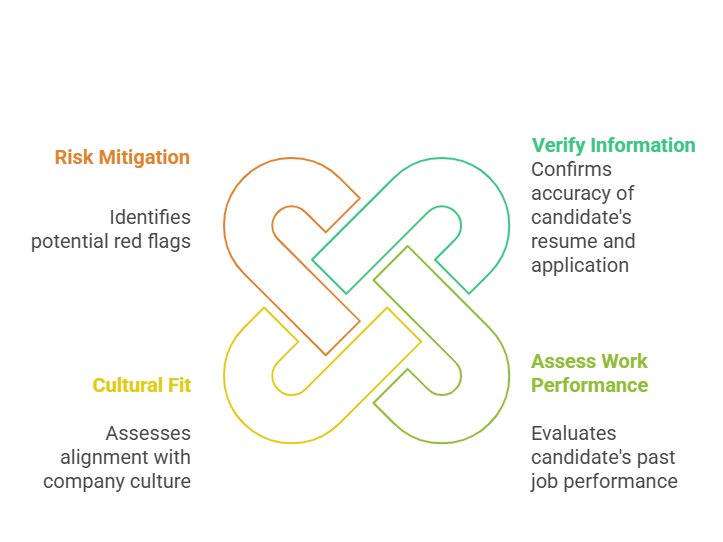
Employment reference checks serve several important purposes:
- Verify Information: They help confirm the accuracy of the candidate’s resume and application, including job titles, responsibilities, and dates of employment.
- Assess Work Performance: Reference checks allow employers to gain a more detailed understanding of how the candidate performed in previous roles, particularly in areas such as communication, teamwork, leadership, and problem-solving.
- Cultural Fit: They can provide insights into how well the candidate is likely to adapt to the company’s work culture and values.
- Risk Mitigation: Reference checks help identify potential red flags, such as dishonesty, behavioral issues, or other concerns that could impact the candidate’s suitability for the role.
Types of References Typically Checked
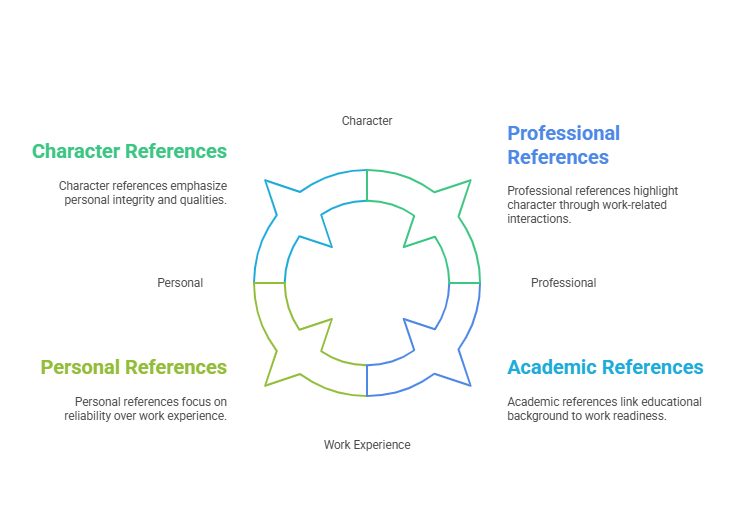
Employers usually contact several types of references during the employment reference check process. Here are the most common:
- Professional References:
- Former supervisors or managers who can speak to the candidate’s job performance, skills, and work ethic.
- Colleagues or co-workers who can provide a peer perspective on how the candidate collaborates and contributes to team efforts.
- Character References:
- Individuals who may not have worked directly with the candidate but can vouch for their character, integrity, and personal qualities (e.g., mentors, community leaders).
- Academic References:
- Relevant for candidates who have limited work experience, such as recent graduates, academic references can come from professors, academic advisors, or internship supervisors.
- Personal References:
- Personal acquaintances who can attest to the candidate’s personality, behavior, and reliability. These references are often used when the candidate has little work experience.
Importance of Employment Reference Checks
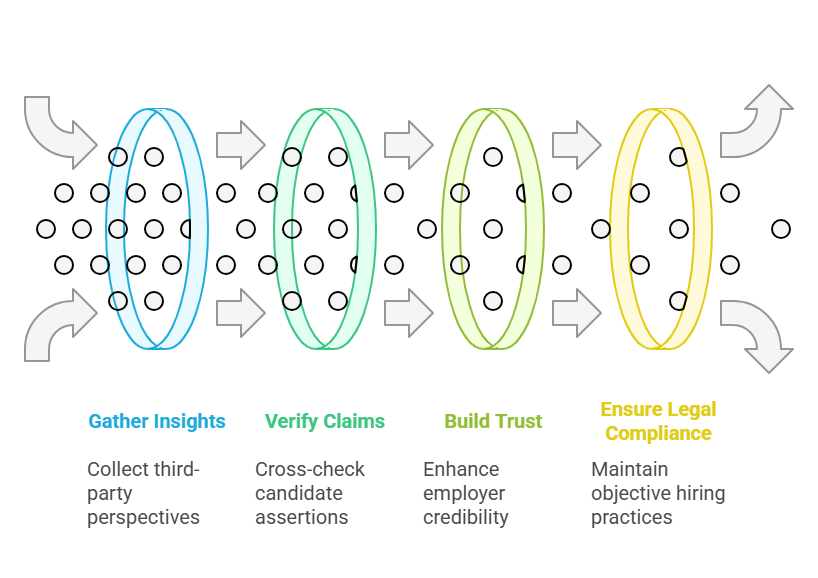
Employment reference checks are a critical step in the hiring process for several reasons:
- Improved Hiring Decisions: By gathering third-party insights, employers can make more informed decisions, which can help prevent bad hires and ensure the selected candidate meets the job’s requirements.
- Verification of Candidate Claims: Candidates may present themselves in the best possible light, but references provide a more objective view of their abilities and achievements.
- Enhanced Trust and Credibility: A thorough reference check demonstrates a commitment to thorough due diligence, which can increase the credibility of the employer and build trust with candidates.
- Legal Protection: Employment reference checks help employers avoid discrimination and ensure that hiring decisions are based on objective, verifiable data rather than bias or assumptions.
How Do Employers Conduct Employment Reference Checks? A Step-by-Step Guide
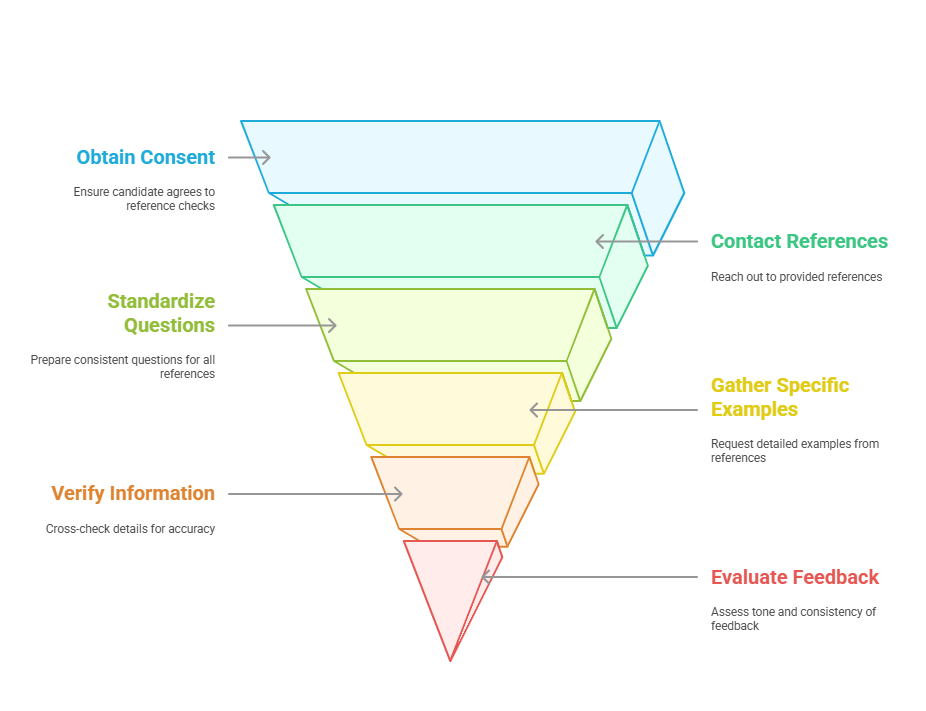
Conducting employment reference checks is a systematic process that requires employers to carefully gather and evaluate feedback from individuals who have worked with the candidate. The goal is to confirm the candidate’s qualifications and gain insights into their work history, skills, and overall performance. Here’s a step-by-step guide on how employers typically conduct reference checks:
Step 1: Obtain Candidate Consent
Before contacting any references, employers must first obtain written or verbal consent from the candidate. This is not only a professional courtesy but also ensures that the candidate is aware of who will be contacted and the type of information that will be requested. Consent is also important from a legal standpoint to protect the employer from any privacy violations.
Step 2: Contact References
Once consent is obtained, employers proceed by reaching out to the references provided by the candidate. This can be done via email, phone, or even video call, depending on the employer’s preference. It’s important for employers to be respectful of the reference’s time and to schedule calls during business hours.
Step 3: Prepare a Set of Standardized Questions
To ensure consistency and avoid bias, employers should prepare a list of standardized questions to ask all references. This helps them evaluate candidates more objectively and compare feedback across different references. Typical questions might include:
- How do you know the candidate?
- What was the candidate’s role and job responsibilities?
- How did the candidate perform in their role?
- What strengths and skills did the candidate demonstrate?
- Were there any areas for improvement?
- How did the candidate interact with colleagues and supervisors?
Standardizing the questions also helps ensure that the reference checks remain focused on relevant information and stay within legal boundaries.
Step 4: Ask for Specific Examples
To gain a clearer understanding of the candidate’s qualifications, it’s essential to ask for specific examples that demonstrate their skills, achievements, and behaviors. For instance, instead of simply asking, “Was the candidate a good communicator?” employers should ask, “Can you provide an example of how the candidate communicated effectively in a team project or with clients?”
These examples offer concrete evidence that can help verify the candidate’s qualifications and fit for the position.
Step 5: Verify Information
During the reference check, employers should verify key details provided by the candidate, such as employment dates, job titles, and specific responsibilities. If discrepancies arise during the conversation, it’s important to address them diplomatically and ask for clarification. For example, if a reference mentions that the candidate held a different title than what was listed on their resume, this discrepancy should be noted for further evaluation.
Step 6: Evaluate the Tone and Feedback
Beyond the content of the responses, employers should also pay attention to the tone of the conversation. A reference who is hesitant or vague may indicate concerns or an unwillingness to provide a strong endorsement. On the other hand, a reference who speaks enthusiastically and offers specific examples of the candidate’s contributions is likely providing positive feedback.
It’s also important to look for consistency across different references. If multiple references mention similar strengths or concerns, this can give employers a clearer picture of the candidate’s capabilities and potential fit for the role.
Step 7: Document the Findings
After completing the reference check, employers should document the feedback gathered. This includes notes on the questions asked, the answers received, and any important observations or red flags. Proper documentation ensures that the hiring process is transparent and provides a record of the candidate’s qualifications and the references’ feedback for future review.
Documentation also serves as protection in case any disputes arise later, such as if the candidate challenges the feedback or claims that they were unfairly judged.
Step 8: Review the Information and Make an Informed Decision
Once all references have been checked, employers should review the feedback in conjunction with other aspects of the hiring process, such as the candidate’s resume, interview performance, and any background checks. If the reference checks provide a positive picture of the candidate, they can move forward with the hiring process.
If concerns or discrepancies arise during the reference check, employers should address them before making a final decision. For example, if a reference mentions that the candidate had difficulty working with a team, this may prompt further discussion with the candidate to clarify the issue.
Table: Reference Check Process Overview
| Step | Action | Details |
|---|---|---|
| Step 1 | Obtain consent | Get written or verbal approval from the candidate. |
| Step 2 | Contact references | Reach out to provided references via phone, email, or video call. |
| Step 3 | Prepare standardized questions | Ensure questions are consistent for all references. |
| Step 4 | Ask for specific examples | Request concrete examples of the candidate’s skills and behaviors. |
| Step 5 | Verify information | Confirm dates of employment, titles, and responsibilities. |
| Step 6 | Evaluate the tone and feedback | Observe the reference’s tone and willingness to provide specific feedback. |
| Step 7 | Document findings | Keep accurate notes of the feedback and any concerns. |
| Step 8 | Review and make an informed decision | Evaluate the feedback and other hiring factors to decide on the candidate. |
FAQs and Tips for Employers and Job Seekers on Employment Reference Checks
Employment reference checks are an essential part of the hiring process, helping employers validate a candidate’s skills, work history, and overall fit for a role. However, there are many considerations both for employers conducting the checks and job seekers preparing for them. In this section, we’ll address common questions about employment reference checks and provide actionable tips for both employers and job seekers.
FAQs About Employment Reference Checks
What Information is Typically Sought During an Employment Reference Check?
During an employment reference check, employers typically seek information related to the candidate’s job performance, character, and qualifications. Some of the most common aspects that employers want to confirm or learn about include:
- Employment History: Confirmation of the candidate’s job titles, dates of employment, and key responsibilities.
- Job Performance: Insight into how well the candidate performed in their role, including their strengths and areas for improvement.
- Skills: Information about the candidate’s technical, interpersonal, and soft skills relevant to the job.
- Work Ethic: Feedback on the candidate’s attitude toward work, including their punctuality, reliability, and ability to meet deadlines.
- Team Dynamics: How the candidate worked with colleagues, supervisors, and subordinates.
- Reason for Leaving: Understanding why the candidate left the previous position, whether by choice or due to external circumstances like layoffs or terminations.
How Do Employment Reference Checks Impact Hiring Decisions?
Employment reference checks play a significant role in finalizing hiring decisions. While they are just one part of the process, they can provide valuable insights that interviews or resumes alone might not reveal. Here’s how reference checks influence hiring:
- Validation of Information: Employers can verify that the candidate’s resume is accurate, ensuring that job titles, dates of employment, and qualifications match the reference’s feedback.
- Assessing Job Fit: Feedback from references helps employers assess whether the candidate is a good fit for the job. For example, if a candidate has strong technical skills but struggles with teamwork, a company prioritizing collaboration may reconsider.
- Identifying Red Flags: Reference checks can uncover potential red flags, such as a candidate’s history of workplace conflicts, poor performance, or dishonest behavior. This information can be crucial in making a well-informed hiring decision.
- Building Confidence: Positive feedback from references can increase an employer’s confidence in a candidate, leading to a quicker and more favorable decision.
Can an Employee Dispute Information Found During a Reference Check?
While candidates have limited ability to challenge what is shared in reference checks, they can dispute information if it is inaccurate or misleading. If an employee believes that a reference check has revealed incorrect or biased information, here are the steps they can take:
- Clarify the Information with the Employer: If the candidate believes the reference was incorrect, they should discuss it with the hiring employer and provide evidence or context to clarify the issue.
- Request a Copy of the Reference: In some cases, employees may request a copy of the reference check, although not all employers are legally obligated to provide this. Having a copy of the reference can help the candidate address any discrepancies.
- Legal Action: If the information is defamatory or intentionally misleading, the candidate could take legal action, although this is typically a last resort. Employees can consult a lawyer to explore their options.
How Should Job Seekers Prepare for an Employment Reference Check?
Job seekers should be proactive in preparing for employment reference checks to ensure they leave a positive impression with their references and the hiring employer. Here are some tips for job seekers:
- Choose References Wisely: Select references who are familiar with your work and can speak positively about your skills and accomplishments. Ensure they are willing to provide a good reference and have an understanding of your current job search.
- Notify References in Advance: Always inform your references when they may be contacted and provide them with details about the position you’re applying for. This ensures they are prepared to speak knowledgeably about your qualifications.
- Provide Updated Contact Information: Make sure your references are aware of the best ways to reach you and provide up-to-date contact information, including phone numbers and email addresses.
- Prepare Your References: Give your references a brief overview of your recent work and any key achievements you would like them to highlight. This allows them to provide more targeted and relevant feedback during the reference check.
- Stay Transparent: If you’ve had challenges in previous roles or left jobs under less-than-ideal circumstances, be honest with your references and hiring employers about the situation. It’s better to address potential concerns upfront than have them raised unexpectedly during the reference check.
What Role Do Reference Checks Play in Reducing Hiring Risks for Employers?
Reference checks help mitigate hiring risks by providing employers with a more accurate picture of a candidate’s suitability for the job. Here’s how they play a role in risk reduction:
- Confirming Candidate Integrity: Reference checks help verify that candidates have the qualifications they claim and have performed well in previous roles, reducing the risk of hiring someone who is dishonest about their experience.
- Assessing Soft Skills: Employers can evaluate a candidate's soft skills, such as communication, teamwork, and conflict resolution, through feedback from references. This helps ensure that the candidate will be a good cultural fit within the organization.
- Identifying Potential Red Flags: If references reveal concerns about the candidate’s behavior, performance, or attitude, employers can decide whether to proceed with the hire or look for other candidates who better align with the company’s needs.
- Reducing Legal and Compliance Risks: By verifying the accuracy of a candidate’s background, employers reduce the chances of hiring someone with a criminal history, dishonest work history, or other issues that could pose legal or compliance risks.
Tips for Employers and Job Seekers
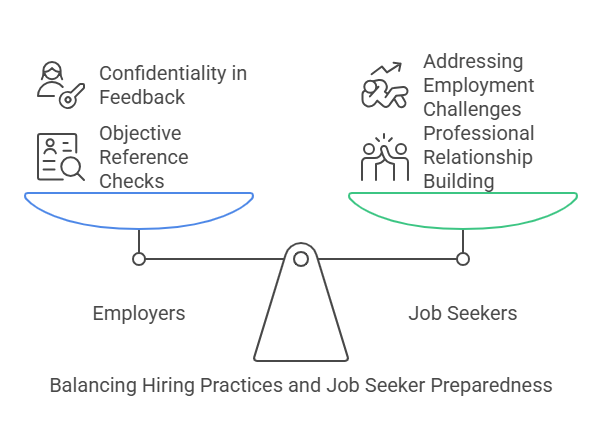
For Employers:
- Be Objective: Keep reference checks focused on job-related questions and avoid personal biases.
- Respect Confidentiality: Only share feedback from reference checks with relevant team members and respect privacy guidelines.
- Don’t Rely Solely on References: Use reference checks as part of a broader hiring strategy, including interviews, assessments, and background checks.
For Job Seekers:
- Maintain Professional Relationships: Build strong, positive relationships with supervisors and colleagues who can later serve as references.
- Be Prepared to Discuss Challenges: If there are any negative aspects of your past employment, address them proactively and professionally during interviews or when communicating with references.
Conclusion
Employment reference checks are a crucial tool in the hiring process, offering valuable insights for employers and preparing job seekers for the next step in their career. By understanding how reference checks work, what information is gathered, and how to navigate the process effectively, both employers and job seekers can ensure a smoother, more informed decision-making process. Following these tips and practices can lead to better hires, stronger professional relationships, and ultimately, a more successful hiring experience.
